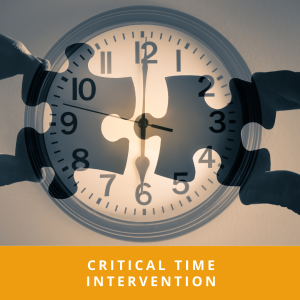Critical Time Intervention

About this Training:
Critical Time Intervention (CTI) is an empirically supported, intensive, case management model that is designed to work with vulnerable people during times of transition in their lives.
Originally developed at Columbia University in conjunction with the New York State Psychiatric Institute, the National Institute of Mental Health, and the New York State Office of Mental Health, CTI has been successful in working with various populations around the globe and has seen great success in preventing homelessness, particularly with populations of people who have a mental illness.
CTI focuses on a phased approach over a prescribed and limited time period wherein case managers work intensively with participants to develop a robust network of professional and natural supports while engaging in meeting and intensity tapering – working most intensively with participants early on and then tapering that intensity as time and housing stabilization occur. Further, a very specific type of Case Conferencing is taught and practiced that provides practical examples and practice with how it can be implemented.
| Instructor Led (In-person and virtual options) |
|
Training Audience: This training is appropriate for:
Note – The TTA requests that all training include at a minimum, one member of leadership from each organization/agency represented, be present as a learner. |
|
Training Length: In-Person: 2 back-to-back days (15 hrs) |
|
Training Capacity: In-Person: 40 maximum / 8 Minimum |
|
Training Objectives: Attendees will:
|
|
Training Features: In-Person:
|
|
Training Prerequisite Onboarding Modules Mandatory: None |
|
Certificate of Completion Through the TTA LMS, attendees will have the ability to receive a certificate of completion of the training by:
Once the assessment is passed, a link will appear allowing the certificate to be downloaded. |
|
Training Costs: Please inquire using the “Request More Info” button to the right regarding fee. Please note that all fees quoted should be considered an “all-inclusive” cost which means there would be not additionl costs for travel, prep, admin, or other items added to the rate provided to you with the exception of provincial tax. Members: A system, community, or organization can become a “Member” by purchasing an annual subscription to self-paced online onboarding modules. Discounts on live training are available determined by the subscription package chosen. (See “Onboarding Module” section here). |
Learners will begin with an evidence-based and “theoretical” background on the approach and then move into a series of very practical and “hands-on” exercises together that will demonstrate the earlier work in all of its components while receiving a great deal of feedback from the instructor.
The exercise portion of the training is very hands-on and learners should arrive ready to move and participate heavily in discussions, roleplays, and debriefs.
